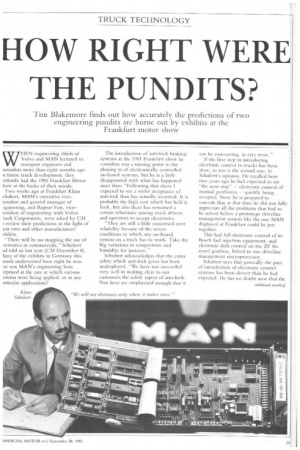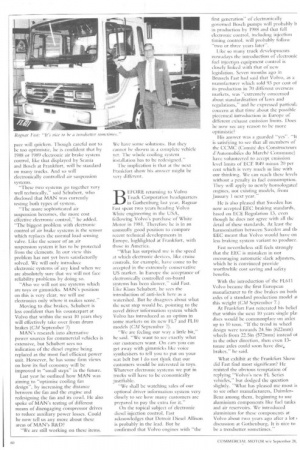HOW RIGHT WERE THE PUNDITS?
Page 61

Page 62

If you've noticed an error in this article please click here to report it so we can fix it.
Tim Blakemore finds out how accurately the predictions of two engineering pundits arc borne out by exhibits at the Frankfurt motor show
WI [EN engineering chiefs of Volvo and MAN lectured to transport engineers and mrnalists more than eight months ago n future truck development, they vidently had the 1985 Frankfurt Motor how at the backs of their minds. Two weeks ago at Frankfurt Klaus chubert, MAN's executive viceresident and general manager of agineering, and Ragnar East, viceresident of engineering with Volvo 'ruck Corporation, were asked by CM i review their predictions in the light of ieir own and other manufacturers' {hibits.
"There will be no stopping the use of eetronics in commercials," Schubert ad told us last year (CM December 8). lany of the exhibits in Germany this tomb underscored how right he was. ut was MAN's engineering boss irprised at the rate at which various rstems were being applied, or at any articular applications?
The introduction of anti-lock braking systems at the 1981 Frankfurt show he considers was a turning point in the phasing in of electronically controlled on-board systems, but he is a little disappointed with what has happened since then: "Following that show I expected to see a wider acceptance of anti-lock than has actually occurred. It is probably the high cost which has held it hack, but also there has remained a certain reluctance among truck drivers and operators to accept electronics.
"They are still a little concerned over reliability because of the severe conditions in which any on-board system on a truck has to work. Take the big variations in temperature and humidity for instance."
Schubert acknowledges that the extra safety which anti-lock gives has been underplayed. "We have not succeeded very well in making clear to our customers the safety aspect of anti-lock. Nor have we emphasised enough that it
can be cost-saving, in tyre wear."
If the first step in introducing electronic control to trucks has been slow, so too is the second one, in Schubert's opinion. He recalled how two years ago he had expected to see "the next step" — electronic control of manual gearboxes — quickly being accepted. Now he is prepared to concede that at that time he did not fully appreciate all the problems that had to be solved before a prototype drivelinc management system like the one MAN displayed at Frankfurt could be put together.
-[his had full electronic control of its Bosch fuel injection equipment, and electronic shift control on the ZF 16speed gearbox, linked to one driveline management microprocessor.
Schubert says that generally the pace of introduction of electronic control systems has been slower than he had expected. lie has no doubt now that the
pace will quicken. Though careful not to be too optimistic, he is confident that by 1988 or 1989 electronic air brake system control, like that displayed by Scania and Bosch at Frankfurt, will be standard on many trucks. And so will electronically controlled air suspension systems.
"These two systems go together very well technically,said Schubert, who disclosed that MAN was currently testing both types of system.
"The more sophisticated air suspension becomes, the more cost effective electronic control," he added. "The biggest problem with electronic control of air brake systems is the sensor which replaces the normal load sensing valve. Like the sensor of an air suspension system it has to be protected from the elements. In our view this problem has not yet been satisfactorily solved. We will only introduce electronic systems of any kind when we are absolutely sure that we will not face reliability problems by doing so.
"Also we will not use systems which are toys or gimmicks. MA N's position on this is very clear, we will use electronics only where it makes sense."
Moving to disc brakes, Schubert is less confident than his counterpart at Volvo that within the next 10 years they will effectively take over from drum brakes (CM September 7) MAN's research into alternative power sources for commercial vehicles is extensive, but Schubert sees no indication of the diesel engine being replaced as the most fuel efficient power unit. However, he has some firm views on how its fuel economy will be improved in "small steps" in the future.
Last year he outlined how MAN was aiming to "optimise cooling fan design", by increasing the distance between the fan and the engine and redesigning the fan and its cowl. He also spoke of MAN's testing of different means of disengaging compressor drives to reduce auxiliary power losses. Could he now tell us any more about these areas of MAN's R&D?
"We are still working on these items. We have some solutions. But they cannot be shown in a complete vehicle yet. The whole cooling system installation has to be redesigned."
The implication is that at the next Frankfurt show his answer might be very different.
BEl' ORE returning to Volvo Truck Corporation headquarters in Gothenburg last year, Ragnar fast spent two years heading Volvo White engineering in the USA,
following Volvo's purchase of White Motor in 1981. Therefore he is in an unusually good position to compare recent technical developments in Europe, highlighted at Frankfurt, with those in America.
"What has surprised me is the speed at which electronic devices, like cruise controls, for example, have conic to be accepted in the extremely conservative US market. In Europe the acceptance of electronically controlled on-board systems has been slower," said Fast. Like Klaus Schubert, he sees the introduction of anti-lock here as a watershed. But he disagrees about what the next step would he, pointing to the novel driver information system which Volvo has introduced as an option in sonic markets on its new FL7 and ELI() models (CM September 7).
"We are feeling our way a little hit," he said. "We want to see exactly what our customers want. On cars you can get away with gimmicks like voice synthesisers to tell you to put on your seat belt but 1 do not think that our customers would be interested in toys. Whatever electronic systems we put in trucks will have to be economically justifiable.
"We shall be watching sales of our optional driver information system very closely to see how many customers are prepared to pay the extra for it."
On the topical subject of electronic diesel injection control, Fast acknowledges that Detroit Diesel Allison is probably in the lead. But he confirmed that Volvo engines with "the
first generation" of electronically governed Bosch pumps will probably b in production by 1988 and that full electronic control, including injection timing control, will probably follow -two or three years later".
Like so many truck developments nowadays the introduction of electronic fuel injection equipment control is closely linked with that of new legislation. Seven months ago in Brussels Fast had said that Volvo, as a manullicturer which sold 93 per cent of its production in 70 different overseas markets, was "extremely concerned about standardisation of laws and regulations," and he expressed particuk concern at that time about the possible piecemeal introduction in Europe of different exhaust emission limits. Does he now see any reason to be more optimistic?
His answer was a guarded "yes". "It is satisfying to see that all members of the CCMC (Comite des Constructeurs d'Automobilcs du Marche Commune) have volunteered to accept emission level limits of ECE R49 minus 20 per cent which is very much in line with our thinking. We can reach these levels without a penalty in fuel consumption. They will apply to newly homologated engines, not existing models, from January 1 next year.'' He is also pleased that Sweden has now accepted EEC braking standards, based on ECE Regulation 13, even though he does not agree with all the detail of these standards. At least the harmonisation between Sweden and thi EEC meant that Volvo would have on less braking system variant to produce.
Fast nevertheless still feels strongly that the EEC is mistaken in not encouraging automatic slack adjusters, which he is convinced provide worthwhile cost saving and safety benefits.
With the introduction of the FL611 Volvo became the first European manufacturer to tit disc brakes on both axles of a standard production model al this weight (CM September 7.)
At Frankfurt Fast reiterated his belief that within the next 10 years single plal discs would be commonplace on axles up to 10 tons. "If the trend in wheel design were towards 24. Sin (622mm) wheels from 22. Sin (572min) instead ol in the other direction, then even 13tonne axles could soon have disc brakes," he said.
What exhibit at the Frankfurt Show did Fast find most significant? He resisted the obvious temptation of replying "Volvo's new FL Series vehicles," but dodged the question slightly. "What has pleased me most is to see other manufacturers, DaimlerBenz among them, beginning to use aluminium components like fuel tanks and air reservoirs. We introduced aluminium for these components at Volvo about two years ago after a lot discussion at Gothenburg. It is nice to be a trendsetter sometimes,"




























































































